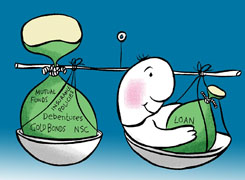Ramalingam Kalirajan |8220 Answers |Ask -Follow
Mutual Funds, Financial Planning Expert - Answered on May 24, 2024
He has an MBA in finance from the University of Madras and is a certified financial planner.
He is the director and chief financial planner at Holistic Investment, a Chennai-based firm that offers financial planning and wealth management advice.... more

I am a 45 year old housewife. I have been married for 23-24 years and I have children who have grown up. I have had a lot of life experiences in my life. I was mentally abused, because of that i lost self confidence. As I am not financially independent so i can't take any wise decision for me . I feel like illiterate and i dont have any work experience. Now a i feel weak by mentally and physically. today I feel that it is very important to be financial independent. In this all situations i don't understand what to do become financially independent. Please suggest.
Your situation is complex, but achievable goals exist. You can achieve financial independence with the right approach.
Acknowledging Your Strengths
Recognize your life experiences as strengths.
Your journey has equipped you with unique skills and resilience.
This foundation is crucial for building financial independence.
Your dedication to your family shows strong organizational and management skills.
These skills are valuable in many professional settings.
Assessing Your Current Situation
Evaluate your financial status.
List all income sources and expenses.
Understand your financial position clearly.
This will help identify areas for improvement.
Assess your skills and interests.
Identify what you enjoy and where you excel.
This can guide you towards suitable job opportunities.
Enhancing Your Education and Skills
Consider further education or skill development.
Many online courses are affordable and flexible.
They allow you to learn at your own pace.
Focus on skills that can lead to employment.
Computer skills, communication, and project management are in demand.
Exploring Employment Opportunities
Start by looking for part-time or freelance work.
This allows you to gain experience without overwhelming yourself.
Jobs like virtual assistant, content writing, or tutoring can be good starts.
These roles often require skills you already possess.
Starting a Home-Based Business
Consider starting a home-based business.
This can be an excellent way to use your skills.
For example, cooking, crafting, or tutoring can be monetized.
A home-based business offers flexibility and control over your time.
Building a Support Network
Seek support from friends, family, or online communities.
A strong support network can provide encouragement and advice.
Connecting with others in similar situations can be empowering.
Financial Planning and Management
Work with a Certified Financial Planner (CFP).
A CFP can help you create a financial plan tailored to your needs.
They will guide you in budgeting, saving, and investing wisely.
Regular funds investing through a Mutual Fund Distributor (MFD) with CFP credential is beneficial.
They provide professional management and expertise.
Creating a Budget
Develop a budget to track your income and expenses.
This helps in identifying areas where you can save money.
A budget is a vital tool for managing your finances.
Saving and Investing
Start saving a portion of your income.
Even small amounts can grow over time.
Consider investing in actively managed funds.
These funds have professional managers who strive to outperform the market.
Avoiding Debt
Be cautious about taking on new debt.
Focus on paying off existing debts.
This will improve your financial stability.
Health and Well-being
Take care of your physical and mental health.
Exercise regularly and maintain a balanced diet.
Seek professional help if you struggle with mental health issues.
A healthy body and mind are crucial for achieving financial independence.
Continuous Learning
Stay updated with the latest trends in your field of interest.
Continuous learning will enhance your skills and employability.
Setting Realistic Goals
Set short-term and long-term financial goals.
These goals will give you direction and motivation.
Review and adjust your goals regularly.
Conclusion
You have the strength and resilience to achieve financial independence.
Take small steps towards your goals every day.
Seek support and guidance when needed.
Your journey is unique, and every step forward is a success.
Best Regards,
K. Ramalingam, MBA, CFP,
Chief Financial Planner,
www.holisticinvestment.in
You may like to see similar questions and answers below
Ramalingam Kalirajan |8220 Answers |Ask -Follow
Mutual Funds, Financial Planning Expert - Answered on May 13, 2024
Ramalingam Kalirajan |8220 Answers |Ask -Follow
Mutual Funds, Financial Planning Expert - Answered on Jul 25, 2024
Dr Dipankar Dutta |1125 Answers |Ask -Follow
Tech Careers and Skill Development Expert - Answered on Apr 11, 2025
Dr Dipankar Dutta |1125 Answers |Ask -Follow
Tech Careers and Skill Development Expert - Answered on Apr 11, 2025
Dr Dipankar Dutta |1125 Answers |Ask -Follow
Tech Careers and Skill Development Expert - Answered on Apr 11, 2025
Dr Dipankar Dutta |1125 Answers |Ask -Follow
Tech Careers and Skill Development Expert - Answered on Apr 11, 2025
Dr Dipankar Dutta |1125 Answers |Ask -Follow
Tech Careers and Skill Development Expert - Answered on Apr 11, 2025
Dr Dipankar Dutta |1125 Answers |Ask -Follow
Tech Careers and Skill Development Expert - Answered on Apr 11, 2025
Dr Dipankar Dutta |1125 Answers |Ask -Follow
Tech Careers and Skill Development Expert - Answered on Apr 11, 2025
Dr Dipankar Dutta |1125 Answers |Ask -Follow
Tech Careers and Skill Development Expert - Answered on Apr 11, 2025
Mayank Chandel |2191 Answers |Ask -Follow
IIT-JEE, NEET-UG, SAT, CLAT, CA, CS Exam Expert - Answered on Apr 11, 2025
Mayank Chandel |2191 Answers |Ask -Follow
IIT-JEE, NEET-UG, SAT, CLAT, CA, CS Exam Expert - Answered on Apr 11, 2025


















